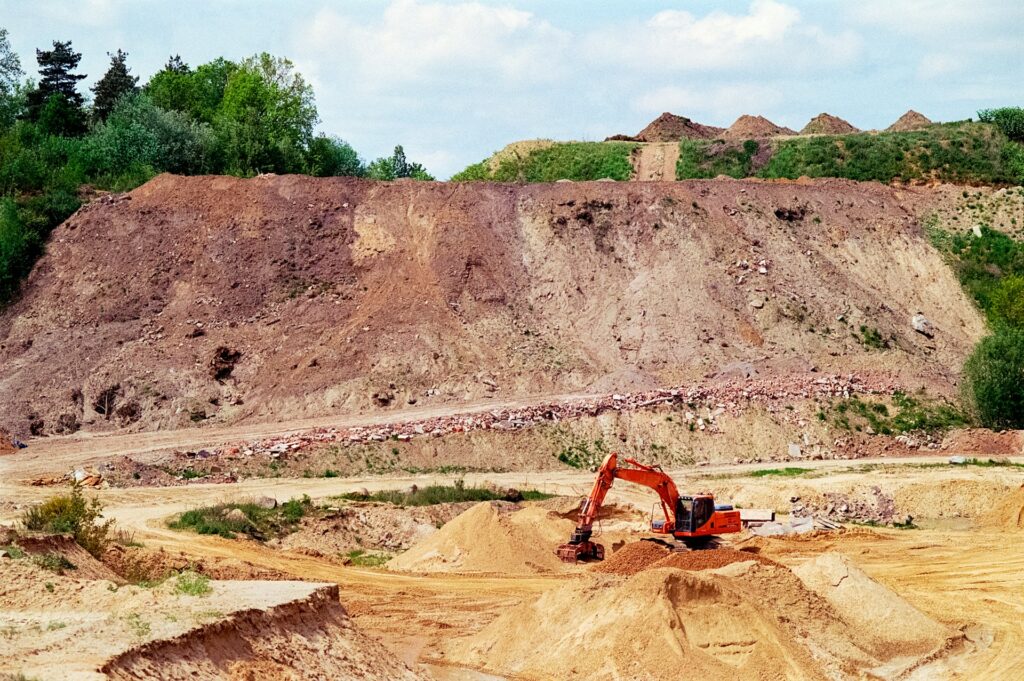A big mining project on an Indonesian island has caused problems for local people. It has cleared many forests, forced people to leave their homes, and polluted the rivers and sea. This has made life very difficult for many Indigenous people living there. A new report talks about how the mining has affected the locals.

News Reading in Levels
A mining project in Indonesia is causing many problems for local people. The project is on the island of Halmahera. It has cleared thousands of hectares of forest. It has also forced people to leave their homes and land. The mining has polluted the rivers and sea. This has made life very hard for many Indigenous people.
The report talked to 45 people living near the mining area. One farmer said the mining company did not pay him the right amount for his land. Another person said the mining has made it difficult to hunt animals in the forest. A fisherman said the sea is dirtier because of the mining, and many fish have died.
Hectares – a unit of area equal to 10,000 square meters
Indigenous – originating or occurring naturally in a particular place
Polluted – contaminated with harmful substances
Devastated – caused severe damage or destruction
Displacement – the forced removal of people from their homes
A massive nickel mining operation in Indonesia has sparked outcry from local Indigenous communities who have had their land seized and livelihoods devastated. The Indonesia Weda Bay Industrial Park (IWIP) project on Halmahera island has cleared vast swaths of forest and forcibly displaced residents, according to a report by Climate Rights International.
The report details accounts from 45 people living near the mining sites. One farmer, Maklon Lobe, said he was intimidated by police into selling his land for a fraction of its value. His pleas were ignored as the companies razed his crops and excavated the area without consent.
Others complained of deforestation destroying their hunting grounds, river pollution cutting off water access, and hot water discharge killing fish stocks. Traditional hunter Arkipus Kone lamented, “Because of the mining, it is rare to catch something.” Fisher Hersina Loha reported dead fish floating regularly due to the power plant discharge.
The nickel is fueling electric vehicle battery production, which the government touts as environmentally friendly. However, locals bear the brunt of ecological devastation in pursuit of these “clean energy” aims.
Outcry – a vigorous public protest
Seized – taken forcibly
Livelihoods – means of earning cash to cover basic needs
Razed – completely destroyed
Lamented – expressed sorrow or regret
A sprawling nickel mining and refining complex on the Indonesian island of Halmahera has wrought environmental havoc and human rights abuses, according to a damning new report. Indigenous communities have been dispossessed of ancestral lands, livelihoods upended, and vital ecosystems ravaged to feed the operations of the Indonesia Weda Bay Industrial Park (IWIP).
The report by Climate Rights International chronicles myriad violations through first-hand accounts. Residents recount coercion, inadequate compensation, and a cavalier disregard for their consent throughout the land acquisition process. Companies have bulldozed traditional hunting grounds while unchecked deforestation has polluted water sources communities rely upon.
Perhaps most egregiously, the report exposes how IWIP’s coal power plants are indiscriminately dumping scorching effluent directly into the seas, asphyxiating marine life that coastal communities subsist on. “All the fish near IWIP are dead, I see them floating, quite often,” one fisherman lamented.
The litany of abuses undermines the Indonesian government’s claims of nurturing a sustainable, ethical nickel industry to propel the clean energy transition. Instead, the Halmahera case exemplifies how extractivism’s insatiable hunger for strategic minerals is trampling human rights and wreaking ecological ruin.
Wrought – past participle of wreak, meaning to cause
Dispossessed – deprived of land, property, or rights
Upended – disrupted or overturned
Ravaged – destroyed or ruined
Cavalier – arrogant and insensitive
Asphyxiating – causing suffocation
Subsist – maintain life, especially with minimal resources
Litany – a long list
Extractivism – the process of extracting natural resources
Insatiable – impossible to satisfy
Let’s check your understanding about the news!
The Bottom Line
The report shows that the mining project has caused a lot of harm to local communities and the environment. People have lost their homes, land, and way of life. The forests, rivers, and sea have been badly polluted. Urgent action is needed to address these issues and protect the rights of Indigenous people. The mining companies must compensate those affected and stop further environmental destruction. The government should also enforce stronger regulations to prevent such abuses in the future.
